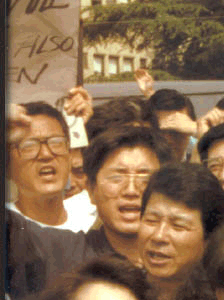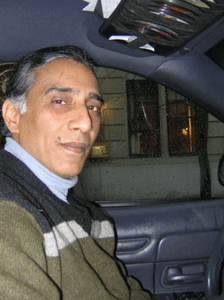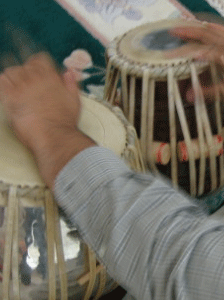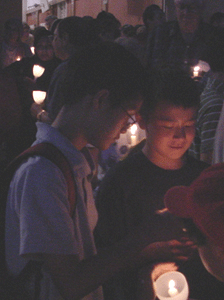With economic downturns and tragic events comes violence – particularly toward Asian Americans – who fight back with grassroots organization. Crossing East sheds light on current discriminatory treatment against Asian Americans from the last two decades and what we can learn from past mistakes.
Listen: Crossing East Program 8: New Waves, New Stormsr
 Segment One: New Movement for Civil Rights
Segment One: New Movement for Civil Rights
he 1980’s and 1990’s ushered in a time of hope and change for Asian Americans. In 1981, Congress—under pressure from the Japanese American community seeking redress and reparations—held hearings across the country. After hearing the 750 testimonies from witnesses, the Commission on Wartime Relocation concluded the internment of Japanese Americans during World War Two was indeed “a grave injustice.” And in 1988, Congress passed the Civil Rights Act, authorizing a formal apology and 20-thousand-dollars in reparations to every survivor of the camps. The next two decades would usher in a generation of Asian Americans who would continue to rise up against any new “grave injustices.” While some Asian Americans participated in civil rights struggles of the 1960s, others bought into the new stereotype of the “model minority”. There was a strong belief if one played by the rules, anyone could succeed in America. But two events greatly challenged the model minority myth and galvanized Asian American communities —the 1982 killing in Detroit of Vincent Chin and the 1999 accusations of spying against Wen Ho Lee.
Acknowledgements:
Alberta Lee and the Lee family, Helen Zia, NPR News Archives, Professor Bill Hing, and Reverend Norman Fong.
New Movement for Civil Rights Archival Material
 Segment Two: Sai-I-Gu
Segment Two: Sai-I-Gu
Perhaps one of the worst riots in U.S. history began in Los Angeles on April 29th 1992. Three days and four nights of demonstrations, civil disobedience, rioting, looting and arson ended with 55 people dead, nearly 2,300 injured, and another 10,000 arrested. More than 1100 buildings were damaged or destroyed in sections of South Central Los Angeles and nearby Koreatown. More than 13,000 National Guard and federal officers were called in to patrol a city that looked like a bombed-out war zone. Though much has been reported about the riots, little has been said about its devastating impact on the Korean American community. Korean convenience stores that sold liquor were especially targeted during and after the riots. Even less has been said of how Korean Americans rose to the challenge of the tragedy, leading to perhaps the largest protest organized by the Asian American community.
Acknowledgements:
NPR News Archives, Professor Edward Chang, Angela Oh, Don Myoung, Sonny Kang, Aqueela Sherrill, Larry Aubrey. Chindo Arrirang was performed by Chang Hye-Jin and Maria K. Seo and provided by Jack Straw Productions in Seattle, Washington.
Produced by Dmae Roberts and Miae Kim
S egment Three: Taxi Turmoil
egment Three: Taxi Turmoil
In April 1998, New York City laid out 17 new rules that increased fines for taxi drivers and made it easier for them to lose their licenses. A majority of the drivers came from India, Pakistan, and Bangladesh, countries that had taken up arms against each other just decades before. But the city’s taxi drivers were angry enough to do what many said couldn’t be done: they organized. For one day, they walked off the job and went on strike and proved they were a force to be reckoned with.
Acknowledgements:
Rizwan Raja, Biju Mathew, Bhairavi Desai, Javaid Tariq, and Taxi and Limousine Commissioner Diane McGrath-McKechnie.
Produced by Deepa Ranganathan
Taxi Turmoil Archival Material
 Segment Four: H1B Blues
Segment Four: H1B Blues
In today’s global economy, job security is fast becoming a dream of the past. The 1990’s brought a new type of worker. In row after row of cubicles across America, immigrant labor powers the high tech industry. Beginning in 1990, the H-1B visa program brought thousands of temporary workers from south Asia to fill vacant jobs in technology and education. Since 9-11, policy debates on immigration have intensified. Problems for workers range from discrimination on the job to being fired at a moment’s notice. Without a job, there’s no visa, and a worker must leave the country almost immediately.
Acknowledgements:
Sharmala Rudrapa, Shavali Shah, and Rajiv.
 Segment Five: Racial Profiling Then and Now
Segment Five: Racial Profiling Then and Now
Hundreds of volunteers walk from San Jose’s Japantown to the South Bay Islamic Association in California. This candlelight walk for peace on the 2004 anniversary of September 11th is one of many events where Japanese and Muslim Americans are joining together, because the attack on the Twin Towers produced another wave of racial violence.
Acknowledgments:
NPR News Archives, Deepa Iyer, Yuri Kochiyama, Bobby Khan interpreting for Malik Ali, Reverend John Oda, and Samena Faheem.
